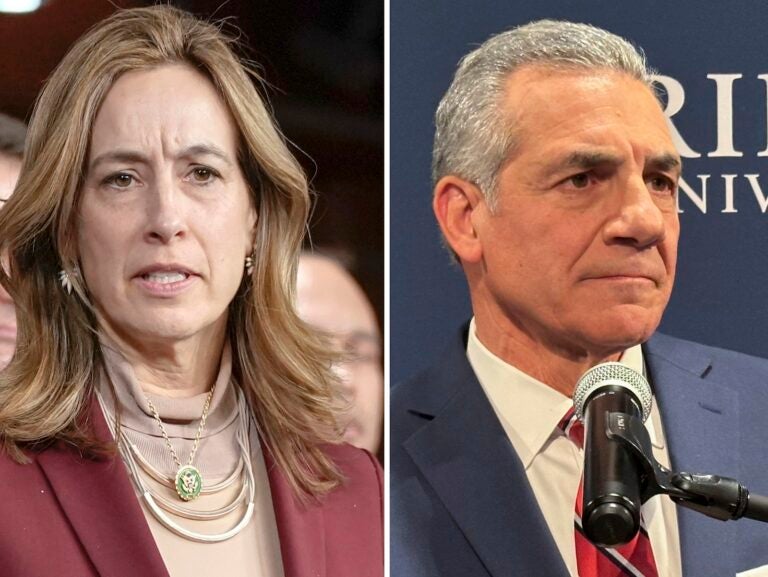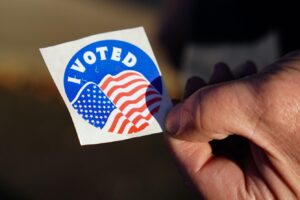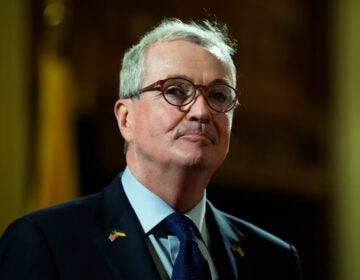New Jersey is guaranteed 3 gubernatorial debates. Here’s why
Gubernatorial candidates who accept public funds for themselves and their running mates are required to participate in debates largely sponsored by media outlets.

File: In this photo combo Rep. Mikie Sherrill, D-N.J., left, speaking during a news conference, Feb. 13, 2024, in Washington and former Assemblyman Jack Ciattarelli speaking, Feb. 4, 2025, at Rider University in Lawrenceville, N.J. (AP Photo/Mariam Zuhaib, Mike Catalini, file)
From Camden and Cherry Hill to Trenton and the Jersey Shore, what about life in New Jersey do you want WHYY News to cover? Let us know.
The New Jersey 2025 gubernatorial race moves to the debate phase Sunday with the first of two face-offs scheduled between Republican Jack Ciattarelli and Democrat Mikie Sherrill. Sponsor Rider University is hosting the first debate on its Lawrenceville campus.
A debate between running mates — James Gannon and Dale G. Caldwell — is scheduled for Tuesday, Sept. 30.
Who is the main agency that oversees gubernatorial debates in New Jersey?
Since 1989, candidates who receive public financing for their campaigns have been required to participate in debates. The New Jersey Election Law Enforcement Commission, ELEC, oversees all aspects of campaign financing for every election and administers public financing for gubernatorial campaigns.
The four-member, bipartisan commission is also responsible for selecting debate sponsors through an application process.
Who can apply to sponsor a New Jersey gubernatorial debate?
News outlets, including newspapers and radio and television stations with “a substantial” audience in New Jersey, can apply to be debate sponsors.
Their applications must include the date and time of the debate broadcast, as well as the specific outlet that has committed to broadcast the debate along with outlets that agreed to simulcast it. Broadcasters must also include information about the size of their New Jersey audience and their geographical reach.
Potential sponsors must also include the venue and the format. They must also share information on how they plan to promote the event and inform the public, as well as provide other details, such as information about the moderators and how the event will be paid for.
“Certain debate sponsors will like to hone in on specific details that they think will be attractive to the commission or that they think will be incredibly worthwhile for the state of New Jersey,” said Amanda S. Haines, executive director of the commission.
Applications to be a debate sponsor are due July 1 during a gubernatorial election year.
A similar process also guides the primary election. Applications to sponsor those debates are due March 15.
“We are directed by statute and by our own regulations to, when possible, select different sponsors for each debate,” Haines said. “[The commission is] not required to select different sponsors for each debate. It depends on the proposals that are presented to them and the types of information that’s provided.”
What is ELEC’s role after a debate sponsor is selected?
Once a debate sponsor is selected, ELEC ensures that the debates take place according to commission-approved plans.
“There is constant contact between our compliance staff and the debate sponsors just to make sure that all the i’s are dotted and t’s are crossed,” said Haines, who added that sponsors cannot unilaterally make changes to their debate plans.
“If something needs to change — a location needs to change, a date and time needs to change — the commission needs to be informed,” she said.
Is there a reason why there isn’t a debate in every region?
Debate locations vary depending on the sponsor. ELEC does not dictate where they should be held.
For 2025, all the debates are being held in Central Jersey.
In addition to Rider University in Mercer County, Ciattarelli and Sherrill will debate again on Oct. 8 at the New Brunswick Performing Arts Center in Middlesex County. Their running mates will debate at Kean University in Union County.
During 2021, when Ciatarelli was challenging Democrat Phil Murphy’s reelection, debates were held in each region of the state. The two debated at the New Jersey Performing Arts Center in Newark and Rowan University in South Jersey. Their running mates — Diane Allen and Sheila Y. Oliver — faced off at Rider.
Rider emphasized streaming
Rider University is one of the sponsors of the first gubernatorial debate alongside online news publication New Jersey Globe and streaming network On New Jersey. The alliance also hosted debates during the primary season.
Micah Rasmussen, director of the Rebovich Institute for New Jersey Politics at Rider University, said their proposal focused on building a streaming audience “rebroadcast by rebroadcast” by adding viewers through social media and where audiences stream content.
“We told the Election Law Enforcement Commission that more viewers are getting TV from streaming now than from cable or broadcast put together,” he said.
New Jersey is also served by two major media markets — New York and Philadelphia — where some television stations share a common owner.
PHL17 in Philadelphia and PIX11 in New York City, both owned by Nexstar Media Group, are sponsoring the debate with the gubernatorial running mates at Kean University, which is also sponsoring along with New Jersey 101.5.
6abc in Philadelphia and WABC-TV in New York City are sponsors of the second gubernatorial debate at the New Brunswick Performing Arts Center. Both stations are part of ABC Owned Television Stations. Their co-sponsors are the Edward J. Bloustein School of Planning and Public Policy at Rutgers University and Univision 41 in New York, which is providing a livestream with Spanish captioning.

Get daily updates from WHYY News!
WHYY is your source for fact-based, in-depth journalism and information. As a nonprofit organization, we rely on financial support from readers like you. Please give today.







